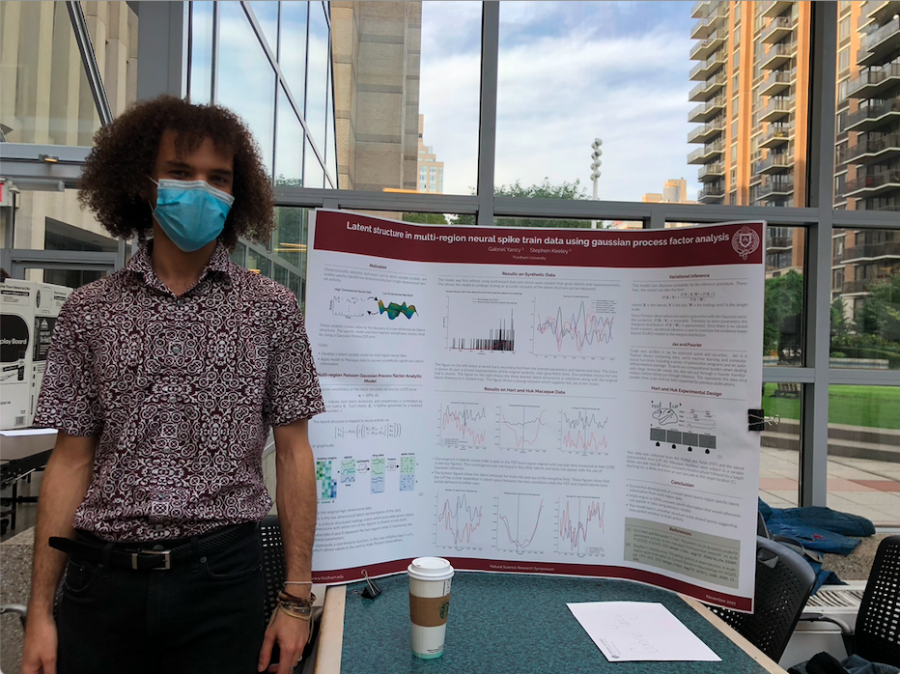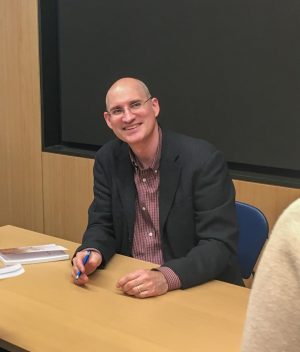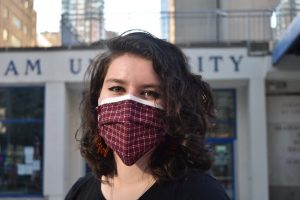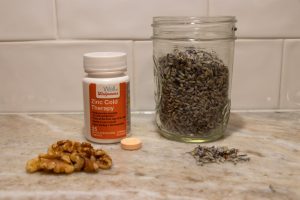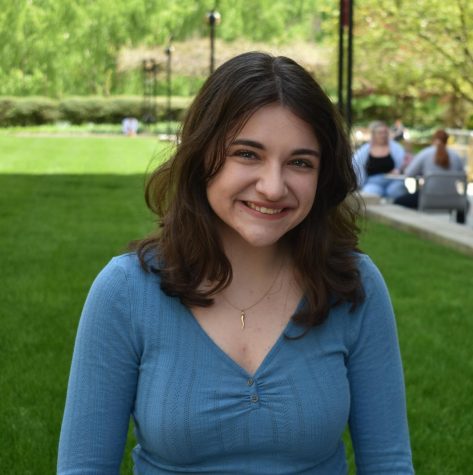Student Researchers in the Spotlight at Symposium
Undergraduate student researchers presented their findings at the annual Mary G. Hamilton Research Symposium
Gabriel Yancy, FCLC ’22, stands in front of his integrative neuroscience poster at the Natural Science Symposium.
December 4, 2021
The Department of Natural Sciences at Fordham College at Lincoln Center (FCLC) hosted its annual Mary G. Hamilton Research Symposium to highlight the research of undergraduate students in the department. Twenty-five students participated in the symposium on Nov. 11, 2021, which began with an awards ceremony for the students followed by poster presentations of their research.
For the first time this year, the symposium was named after Mary G. Hamilton, a former chemistry professor at FCLC. Although Hamilton was unable to attend the symposium, Dr. Martin Di Grandi, associate professor of chemistry at FCLC, delivered opening remarks commending her impressive career.
Hamilton has taught at FCLC since 1982 and conducted daily research at Fordham until the COVID-19 pandemic. She has spent her career encouraging students to get involved in undergraduate research and has personally funded summer research awards for dozens of students.
After the introduction, Dean of FCLC Laura Auricchio also gave opening remarks and stressed the importance of supporting undergraduate research at FCLC. Afterward, students presented their research to the attendees.
Student research varied in subjects from the absorption of microplastics by shrimp and snails in Jamaica Bay, Brooklyn to the relationship between mental and physical health in Latinx people with HIV. The multitude of research topics and scientific disciplines gave students the opportunity to gain valuable career experience in multiple STEM-related fields.
The symposium was open to all Fordham students and faculty and was held in the atrium outside of the Ram Café. Faculty and students were able to approach student researchers one-on-one and learn about their projects. First and second-year STEM majors were given the opportunity to meet third and fourth-year students who conducted research and gave words of encouragement to younger students.
“I’ve been doing research since the summer after my freshman year, so I’d say get on research early and utilize the professors at Fordham.” Frances Murray, FCLC ’22
Frances Murray, FCLC ’22, started doing research as soon as she could at Fordham and she advised others to do the same.
“I’ve been doing research since the summer after my freshman year, so I’d say get on research early and utilize the professors at Fordham,” Murray said. “Ask them about their research and to get you in touch with people to do research with.”
Attending the annual research program has helped rising students understand the research they can get involved with on campus and have an example of what their future at Fordham might hold. Several student researchers presenting at this year’s symposium remembered attending the event in the past and how it influenced their research today.
“I think the most important thing about this is to make science as accessible as possible to everyone.” Rebecca Dubrovsky, FCLC ’22
Rebecca Dubrovsky, FCLC ’22, described coming to the symposium at the beginning of her education as intimidating at first, but she now hopes to make her research as clear to the general public as possible.
“I remember I came to this two years ago and thought ‘I have no idea what I’m reading.’ I think the most important thing about this is to make science as accessible as possible to everyone,” Dubrovsky said.
One thing all of the student researchers had in common was a commitment to making their research accessible to all, regardless of a person’s scientific education or background. Each student made a poster of their research to help explain their findings to the general public.
“This is a great way of getting not just science students but all types of students to be more interested in current events.” Rebecca Dubrovsky
“I think that this is a great way of getting not just science students but all types of students to be more interested in current events,” Dubrovsky said. “What’s great about these posters is not only do they speak to all types of audiences, but they try to make this information as accessible as possible to everyone.”
The symposium is also accessible to STEM students of multiple backgrounds, regardless of their major. Gabriel Yancy, FCLC ’22, reflected on doing research in neuroscience despite not being able to join the integrative neuroscience major his first year.
“It was really significant that I was able to work on this research project,” Yancy said. “I was still able to do computational neuroscience research despite not being part of that major because of the space that we allow for students to do research with professors.”
All of the students who participated in the research symposium were excited to share their findings with their peers and were passionate about their studies. The annual Mary G. Hamilton Research Symposium gave researchers and attendees alike an opportunity to learn more about scientific issues and how Fordham students are paving the way for innovative new research.

